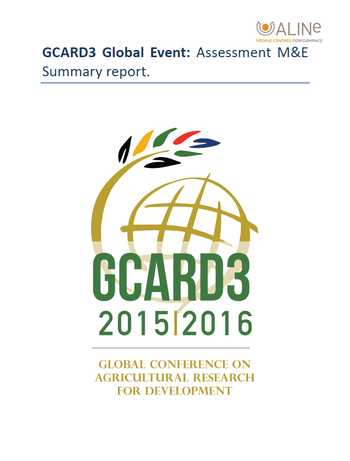The GCARD3 Global Event, held 6th-8th April 2016 in South Africa, was the third milestone in the GCARD process—an inclusive, participatory process providing an opportunity to shape a new agenda for agricultural research for development and new pathways for uptake.
The Agricultural Learning and Impacts Network (ALINe) was appointed as the monitoring and evaluation (M&E) partner for the GCARD3 Global Event. The overall theme for the conference was ‘No One Left Behind’ with thematic sessions, plenary discussions and parallel thematic roundtables based on five key themes identified during the national and regional consultations:
• Scaling up: From research to impact
• Showcasing results and demonstrating impact
• Keeping science relevant and future focused
• Sustaining the business of farming
• Ensuring better rural futures through foresight and collective actions
Throughout GCARD3, ALINe utilized a variety of methods (document review, perceptual feedback questionnaires, face-to face key informant interviews, hard-copy evaluation forms issued to attendees, analysis of social media, public literature) for were employed to monitor the different elements of the process and convey perceptual feedback. This covered all phases from planning through to implementation as well as the legacy of the conference after attendees departed. The aim of these mechanisms has been to both gather information and to identify opportunities for future improvements.
Some findings of the evaluation worth highlighting:
- Theme sessions during the GCARD3 Global Event overwhelmingly met respondent expectations, with 97% of evaluation form respondents stating that the sessions met their expectations “fully” (59%) or “to some extent” (38%).
- Respondents felt that communications were largely strong. On a scale of 1-5 (5 being excellent and 1 being very poor), 70% or respondents scored communication during the conference a 4 or a 5.
- 62% of interview respondents, 89% of evaluation form respondents and 93% of conference survey respondents stated that they made connections at the conference that could become partners in their work.
- 59% of interview respondents and 90% of conference survey respondents stated that they came across ideas at the conference that will be useful in their work.
- 83% of survey respondents reported that they left the conference with specific actions for either themselves or their organisation.
- 21% of respondents stated that they had made “significant changes” to the way they have been working as a result of the ideas/people they encountered at the conference.
- Twenty large multi-stakeholder consultations at the national level and 5 regional multi stakeholder consultations led up to the Global Event, from October 2015 to April 2016. These provided an opportunity for a variety of stakeholders in those specific geographies to meet together to discuss priorities and activities and to provide guidance on future activities. Attendees reported a high level of satisfaction with the content and organisation of the national consultations. 92% stated that the issues addressed during the consultation were either “Mostly” (51%) or “Very” (41%) relevant to their priorities.
- The GCARD process remains unique in engaging true stakeholder involvement beyond the immediate research community. The innovative site-integration work leading from the country consultations was particularly important and charted a new way of working for all stakeholders in the AR4D process.
- Recommendations for improvement included: allowing more time for participants’ contributions and informal discussion and debate during the sessions; ensuring that background material is provided to participants well ahead of time to allow them to prepare for sessions; more effectively raising awareness of the national consultations feeding into the GCARD3 dialogues; and allowing more time for synthesis of the outputs of the consultations to meaningfully shape the structure, content and organization of the conference.

